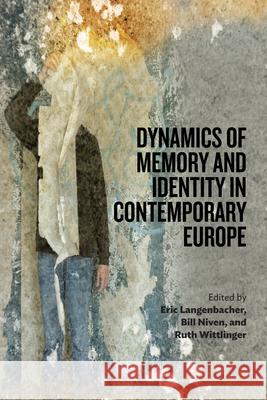Dynamics of Memory and Identity in Contemporary Europe » książka
Dynamics of Memory and Identity in Contemporary Europe
ISBN-13: 9781782389170 / Angielski / Miękka / 2015 / 248 str.
Dynamics of Memory and Identity in Contemporary Europe
ISBN-13: 9781782389170 / Angielski / Miękka / 2015 / 248 str.
(netto: 129,31 VAT: 5%)
Najniższa cena z 30 dni: 135,22
ok. 22 dni roboczych.
Darmowa dostawa!
"The volume is well-structured and the individual chapters are put together in a coherent fashion. The material they cover is extremely engaging and is new to the English-speaking audience, especially where the French and German literature is concerned. They also add richness to a debate already characterised by its increasing politicisation. This is, therefore, a valuable volume ... that] will appeal to a wide range of scholars and students from humanities and social sciences disciplinary backgrounds, from history to anthropology as well as memory scholars. It also provides food for thought at a time when a better understanding of Europe's past, present and future is a political imperative and an incentive for future research." - H-France Review "This is a very interesting and well-researched contribution to the memory studies literature. The individual chapters are based on sophisticated research and provide up-to-date insight into the debates in their fields of specialization. Especially impressive is that, across the board, they draw on literatures and source materials in the languages of interest, so that the volume brings together a new set of materials for an English-speaking audience." - Jenny Wustenberg, Berlin Program for Advanced German and European Studies, Free University of Berlin The collapse of the Iron Curtain, the renationalization of eastern Europe, and the simultaneous eastward expansion of the European Union have all impacted the way the past is remembered in today's eastern Europe. At the same time, in recent years, the Europeanization of Holocaust memory and a growing sense of the need to stage a more "self-critical" memory has significantly changed the way in which western Europe commemorates and memorializes the past. The increasing dissatisfaction among scholars with the blanket, undifferentiated use of the term "collective memory" is evolving in new directions. This volume brings the tension into focus while addressing the state of memory theory itself. Eric Langenbacher is a Visiting Assistant Professor and Director of Honors and Special Programs in the Department of Government, Georgetown University. He is editor of Between Left and Right: The 2009 Bundestag Election and the Transformation of the German Party System (Berghahn, 2010). Bill Niven is Professor of Contemporary German History at Nottingham Trent University. His recent publications include The Buchenwald Child: Truth, Fiction and Propaganda (Camden House, 2007; German edition, 2009), and Memorialization in Germany since 1945 (edited with Chloe Paver, Palgrave Macmillan, 2010). Ruth Wittlinger is a Senior Lecturer in the School of Government and International Affairs at the University of Durham, UK. Her latest monograph is German National Identity in the Twenty-First Century: A Different Republic After All? (Basingstoke, 2010).
"The volume is well-structured and the individual chapters are put together in a coherent fashion. The material they cover is extremely engaging and is new to the English-speaking audience, especially where the French and German literature is concerned. They also add richness to a debate already characterised by its increasing politicisation. This is, therefore, a valuable volume ... [that] will appeal to a wide range of scholars and students from humanities and social sciences disciplinary backgrounds, from history to anthropology as well as memory scholars. It also provides food for thought at a time when a better understanding of Europes past, present and future is a political imperative and an incentive for future research." · H-France Review"This is a very interesting and well-researched contribution to the memory studies literature. The individual chapters are based on sophisticated research and provide up-to-date insight into the debates in their fields of specialization. Especially impressive is that, across the board, they draw on literatures and source materials in the languages of interest, so that the volume brings together a new set of materials for an English-speaking audience." · Jenny Wüstenberg, Berlin Program for Advanced German and European Studies, Free University of BerlinThe collapse of the Iron Curtain, the renationalization of eastern Europe, and the simultaneous eastward expansion of the European Union have all impacted the way the past is remembered in todays eastern Europe. At the same time, in recent years, the Europeanization of Holocaust memory and a growing sense of the need to stage a more "self-critical" memory has significantly changed the way in which western Europe commemorates and memorializes the past. The increasing dissatisfaction among scholars with the blanket, undifferentiated use of the term "collective memory" is evolving in new directions. This volume brings the tension into focus while addressing the state of memory theory itself.Eric Langenbacher is a Visiting Assistant Professor and Director of Honors and Special Programs in the Department of Government, Georgetown University. He is editor of Between Left and Right: The 2009 Bundestag Election and the Transformation of the German Party System (Berghahn, 2010).Bill Niven is Professor of Contemporary German History at Nottingham Trent University. His recent publications include The Buchenwald Child: Truth, Fiction and Propaganda (Camden House, 2007; German edition, 2009), and Memorialization in Germany since 1945 (edited with Chloe Paver, Palgrave Macmillan, 2010).Ruth Wittlinger is a Senior Lecturer in the School of Government and International Affairs at the University of Durham, UK. Her latest monograph is German National Identity in the Twenty-First Century: A Different Republic After All? (Basingstoke, 2010).











